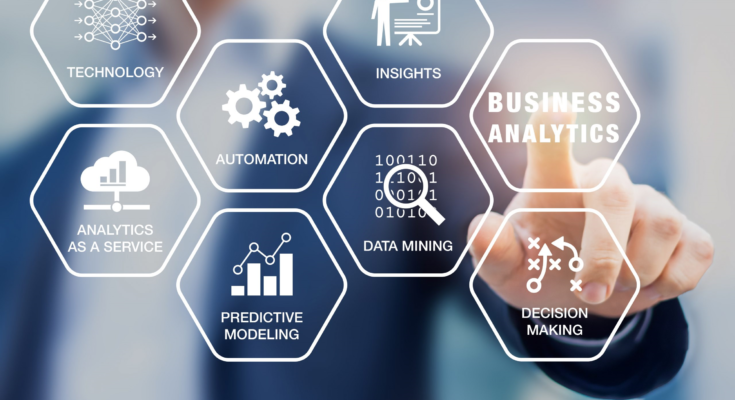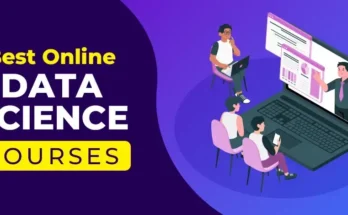To navigate this data-driven era, professionals are increasingly turning to business analytics and data science. These fields have grown exponentially, offering invaluable insights to organizations across the globe. If you’re looking to embark on a journey into the world of business analytics and data science, this article is your comprehensive guide. We’ll explore the key aspects of these fields, and the courses available, address some frequently asked questions, and wrap up with a compelling conclusion.
The World of Business Analytics and Data Science
What is Business Analytics?
Business analytics is the process of examining large sets of data to uncover hidden patterns, correlations, and other useful insights. It is essentially the application of statistical, mathematical, and computational techniques to data in order to enhance business decision-making. By leveraging data analysis tools, businesses can make informed choices that improve performance, optimize processes, and ultimately increase profitability.
What is Data Science?
Data science is a multidisciplinary field that uses scientific methods, algorithms, processes, and systems to extract knowledge and insights from structured and unstructured data. Data science encompasses a range of techniques, including data analysis, machine learning, data visualization, and more. It aims to turn data into actionable information that can drive strategic decisions.
The Role of Business Analytics and Data Science in Today’s World
In an era where businesses generate more data than ever, business analytics and data science are indispensable. They play crucial roles in several areas:
- Business Intelligence: These fields help organizations make sense of their data, identify trends, and make predictions. This, in turn, enables businesses to make informed choices that can give them a competitive edge.
- Customer Insights: Analyzing customer data allows businesses to understand their target audience better, personalize products and services, and improve customer satisfaction and loyalty.
- Predictive Maintenance: In sectors like manufacturing and utilities, predictive analytics helps in preventing equipment failures by identifying issues before they occur, minimizing downtime, and reducing maintenance costs.
- Healthcare: Data science has a pivotal role in healthcare by analyzing patient data to make more accurate diagnoses and predict disease outbreaks.
- E-commerce: Recommender systems in e-commerce platforms, powered by data science, enhance the user experience by suggesting products based on past behaviors and preferences.
- Finance: Financial institutions employ data science to detect fraudulent activities, predict market trends, and manage investment portfolios.
- Supply Chain Optimization: Data-driven decision-making can streamline supply chain operations, reducing costs and improving efficiency.
- Social Media and Marketing: Business analytics helps in measuring the impact of marketing campaigns, optimizing social media strategies, and understanding customer sentiment.
Business Analytics and Data Science Courses
The road to mastering business analytics and data science is paved with numerous educational opportunities. Whether you’re an aspiring data scientist, a seasoned analyst, or a business professional looking to harness data, there’s a course suited for you.
Here are some of the key types of courses in these fields:
1. Bachelor’s Degree Programs
If you’re just starting your academic journey, many universities offer bachelor’s degree programs in data science and business analytics. These programs provide a solid foundation in mathematics, statistics, programming, and data analysis. They typically span four years and offer a comprehensive curriculum.
Key Courses: Mathematics, Statistics, Computer Science, Data Mining, Machine Learning, Business Intelligence.
2. Master’s Degree Programs
For those who already have a bachelor’s degree or relevant work experience, pursuing a master’s degree can be a wise choice. Master’s programs offer more specialized knowledge and may include research projects or internships. A Master of Science (MSc) in Data Science or Business Analytics is a popular option.
Key Courses: Advanced Machine Learning, Big Data Analytics, Data Visualization, Data Ethics, Business Strategy.
3. Online Courses and MOOCs (Massive Open Online Courses)
Online courses have gained immense popularity due to their flexibility and affordability. Platforms like Coursera, edX, and Udacity offer a wide range of courses in data science and business analytics. These courses are perfect for individuals looking to upskill or change career paths.
Key Courses: IBM Data Science Professional Certificate, Google Data Analytics Professional Certificate, Harvard’s Data Science MicroMasters.
4. Bootcamps
Data science and business analytics bootcamps are intensive, short-term programs that equip you with practical skills in a matter of weeks. They are a great choice for professionals who want to quickly acquire job-ready expertise.
Key Courses: General Assembly Data Science Immersive, Flatiron School Data Science Bootcamp.
5. Certifications
Many organizations, such as Microsoft, SAS, and IBM, offer certifications in data science and business analytics. These certifications demonstrate your proficiency in specific tools and technologies and can give your resume a significant boost.
Key Certifications: Microsoft Certified: Azure Data Scientist Associate, SAS Certified Data Scientist, IBM Data Science Professional Certificate.
6. Specialized Workshops and Seminars
Workshops and seminars are often conducted by industry experts and provide deep insights into specific aspects of data science and business analytics. They are usually short and focus on a narrow topic.
Key Workshops: Data Visualization Workshop, Machine Learning Seminar, Business Analytics in Retail.
Also Read: Best Data Science Courses on Udemy
Frequently Asked Questions (FAQ)
To address common queries about business analytics and data science courses, let’s dive into some frequently asked questions:
1. Do I need a strong background in mathematics and programming to pursue a course in data science or business analytics?
While a strong background in mathematics and programming can be beneficial, it’s not always a strict requirement. Many courses cater to beginners and offer introductory classes. However, having a solid foundation in these areas will help you grasp the concepts more quickly.
2. Are there prerequisites for enrolling in data science or business analytics courses?
Prerequisites vary depending on the course and institution. Bachelor’s degree programs often require a high school diploma, while master’s programs may demand a relevant bachelor’s degree. Online courses and bootcamps generally have more flexible entry requirements.
3. How long does it take to complete a data science or business analytics course?
The duration varies widely. Bachelor’s degree programs typically take four years, master’s programs may range from one to two years, online courses can be completed in a few months, and bootcamps often last from 8 to 16 weeks.
4. What career opportunities can I pursue after completing a course in data science or business analytics?
The career opportunities are diverse. You can work as a data scientist, business analyst, data engineer, machine learning engineer, or in roles like data consultant, data architect, and more. The choice largely depends on your specialization and interests.
5. Are there any ethical concerns in data science and business analytics?
Yes, ethical concerns are pertinent in these fields, especially regarding data privacy, bias in algorithms, and the responsible use of data. Many courses now include modules on data ethics to address these issues.
6. Can I transition into data science or business analytics from a different career?
Yes, transitioning into these fields is possible. Many courses are designed to accommodate career changers, and the skills you’ve developed in your previous role can often be valuable in data-driven positions.
7. How important is practical experience in data science and business analytics courses?
Practical experience is crucial. Many courses include hands-on projects and assignments to apply what you’ve learned. It’s through these projects that you gain valuable skills and build a portfolio to showcase to potential employers.
Conclusion
In a world dominated by data, business analytics and data science have become essential tools for success. Whether you’re a recent graduate, a mid-career professional, or someone looking to make a significant career change, there’s a course tailored to your needs and goals. The diverse options, including traditional degrees, online courses, bootcamps, and certifications, make it accessible to virtually anyone.
As you embark on your journey in data science and business analytics, remember that these fields are continually evolving. The technology, tools, and techniques used today may not be the same in a few years. Therefore, a commitment to lifelong learning and staying up-to-date with industry trends is paramount.
In conclusion, business analytics and data science offer exciting prospects for those willing to explore the world of data and analytics. The insights gained from these fields can drive innovation, improve decision-making, and foster growth across industries. Whether you aim to analyze consumer behavior, predict market trends, or optimize supply chains, the knowledge and skills acquired through these courses can pave the way to a successful and rewarding career in the age of data. So, choose your path, embark on your learning journey, and let the data revolution empower your future.




